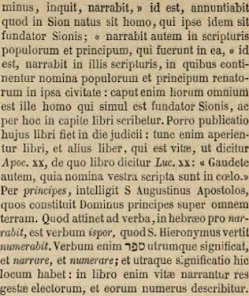Verse 6
The Lord shall tell in his writings of peoples and of princes, of them that have been in her.
Dominus narrabit in scripturis populorum et principum, horum qui fuerunt in ea.
He replies to the question in which he said: “Will anyone say to Sion?” The prophet declares the Lord Himself will say this; moreover He will write it for an everlasting memory in the book in which He writes down the people and princes who through a new birth have been in the city. “The Lord,” he says, “shall tell,” that is, he will announce that a man has been born in Sion who is Himself the
founder of Sion; “He shall tell in his writings of peoples and of princes, of them that have been in her,” that is, he will tell this in those writings of the peoples and princes reborn in that city : for the head of all these is that man who is also the founder of Sion, and for this reason He will be at the head of the book. Moreover, the publication of this book will come to pass in the day of judgement : for then will be opened the books, and another book, which is the book of life, as it says in
Apoc. xx., which is referred to in
Luke x. : “But rejoice in this, that your names are written in heaven.”
[1] By principes / princes, St. Augustine understands the Apostles, whom God established as princes over all the earth. Concerning vocabulary, in Hebrew it has
ispor for
narrabit / shall tell, which St. Jerome translates as
numerabit / shall number. The word can mean either
narrare / to tell or
numerare / to number; and each meaning can apply here : for in the book of life are told the deeds of the elect, and the number of them is described. For the Latin
in scripturis / in his writings, Greek has ἕν γραφᾖ /
in scriptura / in (his) writing, but the number does not change the sense. In Hebrew, it has
in scribendo populos, that is, He will tell, or He will number, while He writes the peoples ; hence we expound the words of the Latin Vulgate edition : in the writings of the peoples, that is, in the writings, in which the peoples are written, or the names of the peoples : for one edition explains the other. The words
et principum / and of princes are transposed in Hebrew after the words: “of them that have been in her;” whereas, among the Hebrews the following verse begins with these words:
et principum / and of princes. But we ought to follow the reading of the Septuagint translators, who had the more accurate books : for this revision seems to be due to the negligence of copyists and obscures the whole meaning. The words
of them that have been in her, are in the singular in Hebrew,
hic natus est in ea / each one born in her, but the sense is the same : when describing the peoples and princes, the Lord shall tell of each one who has been born in her.
[1] But yet rejoice not in this, that spirits are subject unto you; but rejoice in this, that your names are written in heaven. Verumtamen in hoc nolite gaudere quia spiritus vobis subjiciuntur : gaudete autem, quod nomina vestra scripta sunt in caelis. [Luc. x. 20]
Totus tuus ego sum
Et omnia mea tua sunt;
Tecum semper tutus sum:
Ad Jesum per Mariam.



No comments:
Post a Comment